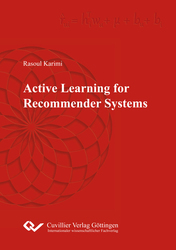| Areas | |
|---|---|
| Serie de libros (96) |
1380
|
| Nachhaltigkeit |
3
|
| Gesundheitswesen |
1
|
| Letra |
2368
|
| Ciencias Naturales |
5408
|
| Matemática | 229 |
| Informática | 319 |
| Física | 980 |
| Química | 1364 |
| Geociencias | 131 |
| Medicina humana | 243 |
| Estomatología | 10 |
| Veterinaria | 108 |
| Farmacia | 147 |
| Biología | 835 |
| Bioquímica, biología molecular, tecnología genética | 121 |
| Biofísica | 25 |
| Nutrición | 45 |
| Agricultura | 1005 |
| Silvicultura | 201 |
| Horticultura | 20 |
| Ecología y conservación de la tierra | 148 |
| Ciencias Ingeniería |
1794
|
| General |
98
|
|
Leitlinien Unfallchirurgie
5. Auflage bestellen |
|
Erweiterte Suche
Active Learning for Recommender Systems (Tienda española)
Rasoul Karimi (Autor)Previo
Indice, PDF (49 KB)
Lectura de prueba, PDF (71 KB)
Nowadays we are living in an era that is overloaded with information. Decision-making in this environment can sometimes become a nightmare. There are too many choices and we simply cannot explore them all. Therefore, it would be really helpful to have a system to help us to find the right choice. Such systems, which learn user preferences and provide personalized recommendations to them are called Recommender Systems.
Evidently, the performance of recommender systems depends on the amount of information that users provide regarding items, most often in the form of ratings. This problem is amplified for new users because they have not provided any rating, which impacts negatively on the quality of generated recommendations. This problem is called new user problem or cold-start problem. A simple and effective way to overcome this problem, is by posing queries to new users so that they express their preferences about selected items, e.g. by rating them. Nevertheless, the selection of items must take into consideration that users are not willing to answer a lot of such queries. To address this problem, active learning methods have been proposed to acquire the most informative ratings, i.e ratings from users that will help most in determining their interests.
The aim of this thesis is to take inspiration from the literature of active learning for machine learning and develop new methods for the new user problem in recommender systems. In the recommender system context, new users play the role of the Oracle and provide labels (ratings) to the queries (items). In this approach, we will take into consideration that although there are no data for new users, but there is abundant data for existing users. Such additional data can help us to develop scalable and accurate active learning methods for the new user problem in recommender systems.
The thesis consists of two parts. In the first part, to be consistent with the settings of active learning in machine learning and the related works on the new user problem in recommender system, it is assumed that the new user is always able to rate the queried items. Next, this constraint is relaxed and new users are allowed not to rate the items.
Most of the developed active learning methods exploit the characteristics matrix factorization because nevertheless, recent research (especially as has been demonstrated during the Netflix challenge) indicates that matrix factorization is a superior prediction model for recommender systems compared to other approaches.
| ISBN-13 (Impresion) | 9783954046928 |
| ISBN-13 (E-Book) | 9783736946927 |
| Formato | A5 |
| Idioma | Inglés |
| Numero de paginas | 152 |
| Laminacion de la cubierta | mate |
| Edicion | 1. Aufl. |
| Lugar de publicacion | Göttingen |
| Lugar de la disertacion | Hildesheim |
| Fecha de publicacion | 22.04.2014 |
| Clasificacion simple | Tesis doctoral |
| Area |
Informática
|
| Palabras claves | Recommender Systems, Cold-Start Problem, Active Learning, Matrix Factorization |








